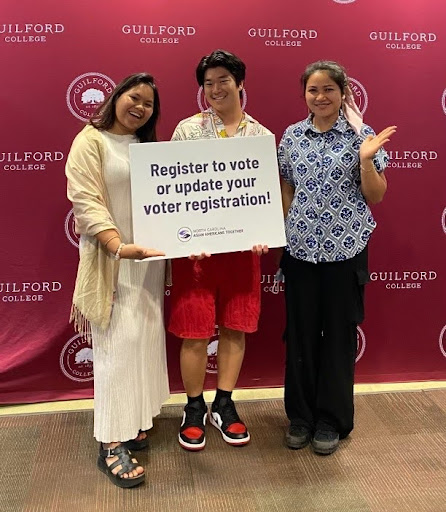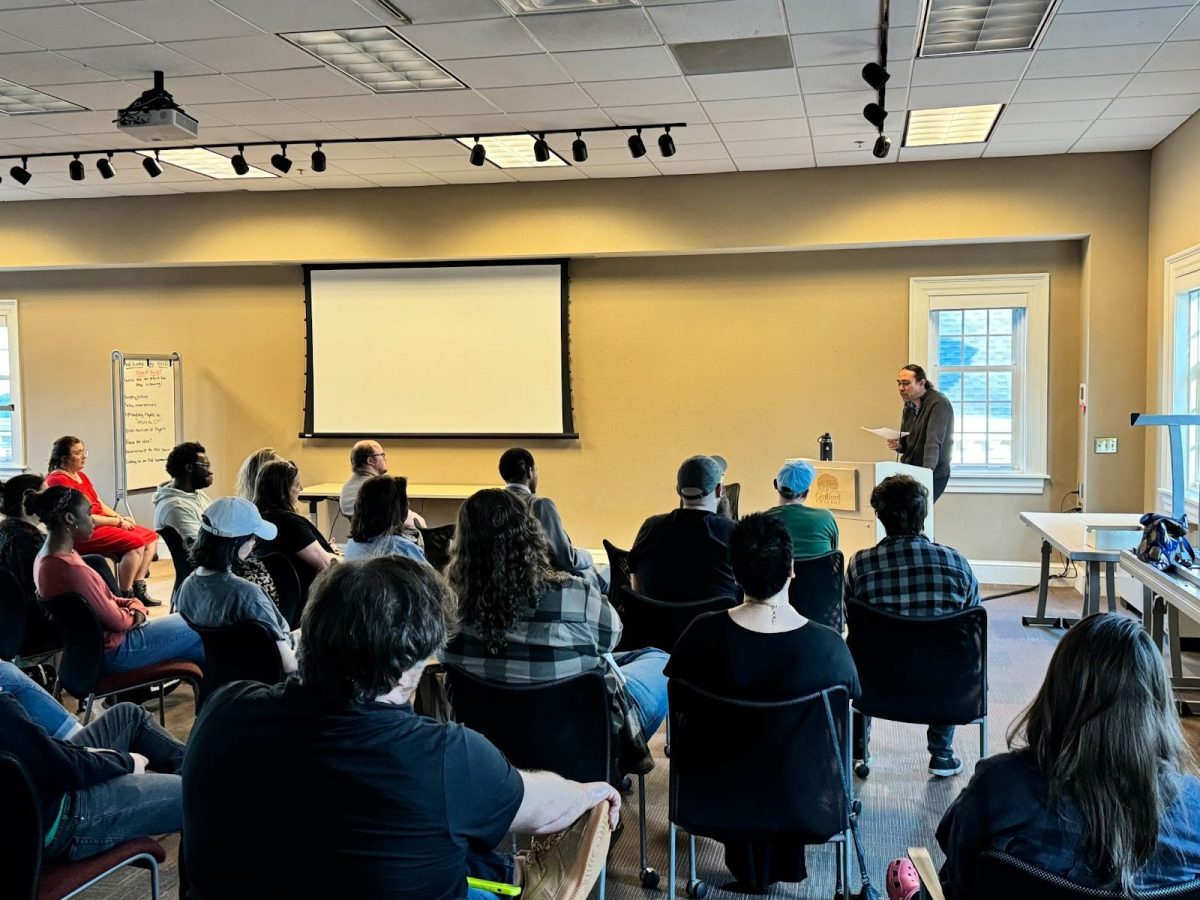“Everything is on the table,” said Ed Winslow III, chairman of the board of trustees. “The board … and the president’s committee are going to take a comprehensive look at everything. There are no sacred cows.”
This was the harsh news that came from the trustees this weekend as they met at the Community Center to determine tuition costs. Guilford’s budget is predicted to experience a $2 million revenue shortfall this year. The administration and the trustees are faced with tough choices to reconfigure the school’s finances and ensure its future financial stability.
The first of those choices was made at the Feb. 28 budget meeting, as the board voted to approve a budget that includes a 2 percent across-the-board hike in tuition and student fees.
Rumors have swirled around a set of budget cuts that will accompany the tuition increase next year.
Winslow emphasized that the tuition hike is smaller than the ones many similar schools have enacted, including Guilford, in previous years.
“We are trying to make college accessible to as broad a range of people as possible during what are still economically challenging times,” said Winslow.
A decline in enrollment, particularly in the CCE program, has been an important factor in Guilford’s budget woes.
According to Dean of Admission and Financial Aid Administrator Andy Strickler, almost 80 percent of Guilford’s revenue comes from tuition dollars. The decline from 1,400 traditional students and 1,300 CCE students in 2011 to the current numbers of 1,190 traditional students and 820 CCE has left the College’s funds wanting.
Budget cuts will be made with input from a committee that President Jane Fernandes has established. Rob Nelson, former vice president of finance for the UNC system, heads the committee.
Winslow said the cuts are likely to be revealed when the trustees meet again on May 29 and May 30.
Students had an opportunity to voice their concerns to the board of trustees on Feb. 25 in the Carnegie room. The main issues and questions were summarized well by junior Teresa Bedzigui, one of the three speakers on behalf of the Bonner Scholars program.
“While Guilford does a fantastic job with environmental sustainability, it does not do so with financial sustainability,” said Bedzigui. “As a result, the College is taking a reactionary stance and cutting programs that define Guilford. What is the meaning of calling ourselves a diverse institution without having as many professors, faculty and staff of color as our students?
“What is a community service based school without a community service based center? I urge you, the board, to look towards the management of the financial budget and change it, and ask, how did we reach this point?”
Reacting to the rumor that the Bonner programs were going to be cut, students came in droves to the Carnegie room to demonstrate how the program had allowed them to attend college and how the Bonner program has been instrumental to the Guilford community.
“We strive to alleviate (the) burdens of the less fortunate and pave a way for them to access education and basic human rights,” said Noelle Lane, senior and Bonner Scholar. “We are all here because Bonner helped us financially. Are the dreams of our children not priceless?”
Responses from the board seem to contradict the rumor.
“I’ve been on the board since 2001, but I don’t know of any group that the trustees have always respected, or felt are more important to this campus, than the Bonner Scholars,” said Jimmy Wilson, interim vice president for finance. “The board has always been supportive of the Bonner program, and if you’ve heard that we were planning to cut the program, I’m afraid that’s erroneous.” (Note to Valeria: still open to cut for space)
Amongst the other issues discussed were sexual assault and lack of diversity relating to professors, students and staff.
“We need to start getting comfortable with having uncomfortable conversations about the intersection of marginalized populations and interpersonal violence and working to end it,” said sophomore Molly Anne Marcotte, who spoke on behalf of the Wellness Education Department.
Another significant issue brought up was the lack of inclusion of CCE students in the Guilford community.
“We’re all Guilford students, but our struggles to the end of the road will be very different,” said Monica Jones, president of CCE SGA. “We’re asking that you include us, and help us include ourselves in the community, which is one of the strongest values that Guilford supposedly stands for. In terms of diversity, we talk the talk, but we don’t walk the walk.”
Strickler, as an officer of enrollment and retention, took the blame for the budgetary issues of the College.
“Our budgetary challenges here at the College are driven by enrollment,” said Strickler, addressing the students and Board of Trustees present at the forum. “If you’re angry at anyone, be angry at me for the enrollment problems at Guilford. That is my job.
“If we want to increase enrollment, we need to continue with this kind of energy and passion because, the most powerful tool for me as a recruiter is a student body that demonstrates this type of love for the Guilford experience.”
The meeting ended with a speech from President Jane Fernandes that reaffirmed her commitment to Guilford, but pulled no punches about the College’s financial straits.
“I want to suggest that Guilford’s financial challenges are extremely grave,” said Fernandes. “The most important thing for all of us to have in mind is that we want Guilford College to be strong for the future.
“I need everybody’s help for us to get through this difficult time. It’s not going to be one program, it’s not going to be one small group of people, (and) it’s not going to be one person. All of us have to make some sacrifices.”
as our students?
“What is a community service based school without a community service based center? I urge you, the board, to look towards the management of the financial budget and change it, and ask, how did we reach this point?”
Reacting to the rumor that the Bonner programs were going to be cut, students came in droves to the Carnegie room to demonstrate how the program had allowed them to attend college and how the Bonner program has been instrumental to the Guilford community.
“We strive to alleviate (the) burdens of the less fortunate and pave a way for them to access education and basic human rights,” said Noelle Lane, senior and Bonner Scholar. “We are all here because Bonner helped us financially. Are the dreams of our children not priceless?”
Responses from the board seem to contradict the rumor.
“I’ve been on the board since 2001, but I don’t know of any group that the trustees have always respected, or felt are more important to this campus, than the Bonner Scholars,” said Vic Cochran ‘71. “The board has always been supportive of the Bonner program, and if you’ve heard that we were planning to cut the program, I’m afraid that’s erroneous.”
Amongst the other issues discussed were sexual assault and lack of diversity relating to professors, students and staff.
“We need to start getting comfortable with having uncomfortable conversations about the intersection of marginalized populations and interpersonal violence and working to end it,” said sophomore Molly Anne Marcotte, who spoke on behalf of the wellness education department.
Another significant issue brought up was the lack of inclusion of CCE students in the Guilford community.
“We’re all Guilford students, but our struggles to the end of the road will be very different,” said Monica Jones, president of CCE SGA.
“We’re asking that you include us and help us include ourselves in the community, which is one of the strongest values that Guilford supposedly stands for. In terms of diversity, we talk the talk, but we don’t walk the walk.”
Strickler, as an officer of enrollment and retention, took the blame for the budgetary issues of the College.
“Our budgetary challenges here at the College are driven by enrollment,” said Strickler, addressing the students and Board of Trustees present at the forum. “If you’re angry at anyone, be angry at me for the enrollment problems at Guilford. That is my job.
“If we want to increase enrollment, we need to continue with this kind of energy and passion because the most powerful tool for me as a recruiter is a student body that demonstrates this type of love for the Guilford experience.”
The meeting ended with a speech from Fernandes that reaffirmed her commitment to Guilford but pulled no punches about the College’s financial straits.
“I want to suggest that Guilford’s financial challenges are extremely grave,” said Fernandes. “The most important thing for all of us to have in mind is that we want Guilford College to be strong for the future.
“I need everybody’s help for us to get through this difficult time. It’s not going to be one program, it’s not going to be one small group of people (and) it’s not going to be one person. All of us have to make some sacrifices.”













Erin • Mar 26, 2015 at 10:50 pm
My darlings, please proof read. There’s a note to Valeria in there.